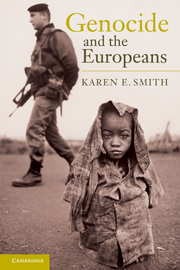Book contents
- Frontmatter
- Contents
- Tables and boxes
- Acknowledgements
- Abbreviations
- 1 The norms against genocide
- 2 European governments and the development of the international legal framework on genocide
- 3 European discourses on genocide during the Cold War
- 4 Bosnia and Herzegovina
- 5 Rwanda
- 6 Kosovo
- 7 Darfur
- 8 Is there a European way of responding to genocide?
- Appendix 1 United Nations General Assembly Resolution 96 (I), 11 December 1946
- Appendix 2 Convention on the Prevention and Punishment of the Crime of Genocide
- Bibliography
- Index
3 - European discourses on genocide during the Cold War
Published online by Cambridge University Press: 05 June 2012
- Frontmatter
- Contents
- Tables and boxes
- Acknowledgements
- Abbreviations
- 1 The norms against genocide
- 2 European governments and the development of the international legal framework on genocide
- 3 European discourses on genocide during the Cold War
- 4 Bosnia and Herzegovina
- 5 Rwanda
- 6 Kosovo
- 7 Darfur
- 8 Is there a European way of responding to genocide?
- Appendix 1 United Nations General Assembly Resolution 96 (I), 11 December 1946
- Appendix 2 Convention on the Prevention and Punishment of the Crime of Genocide
- Bibliography
- Index
Summary
This chapter analyses European debates on genocide from the end of the Second World War through to the end of the Cold War. It considers whether European governments used the term genocide (and came under domestic pressure to use the term) during the Cold War period to describe massive human rights violations in a wide variety of countries. Has there been a change in the discourse about genocide over time, from less use to more use? This chapter also analyses how governments interpreted the definition of genocide and their obligations under the Genocide Convention. Did the definition they used stem from the legal norm of the Convention, or the social norm? And if genocide was perceived to be ongoing, how did European governments respond?
From the 1960s, the term was used quite frequently in public discourse – by opposition (or even backbench) MPs, by civil society groups, by journalists – to describe events, and as a call for action. In this usage, the term was interpreted quite widely, to cover numerous episodes of genocide during the Cold War. In contrast, European governments rarely labelled atrocities as genocide. Although European governments may have become convinced that they had to sign up to the Genocide Convention because it was what ‘civilised nations’ do, or because they found the isolation of not signing up too uncomfortable, they were clearly not willing to use the term ‘genocide’ freely during the Cold War.
- Type
- Chapter
- Information
- Genocide and the Europeans , pp. 65 - 104Publisher: Cambridge University PressPrint publication year: 2010



